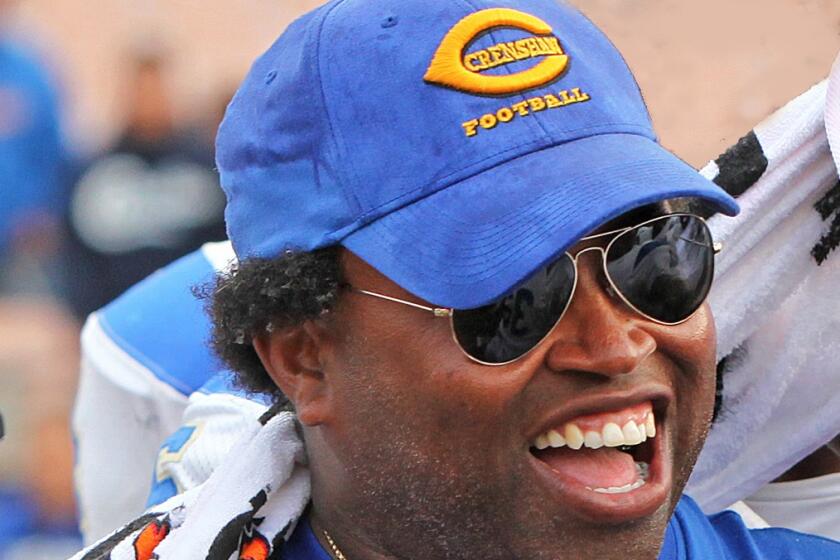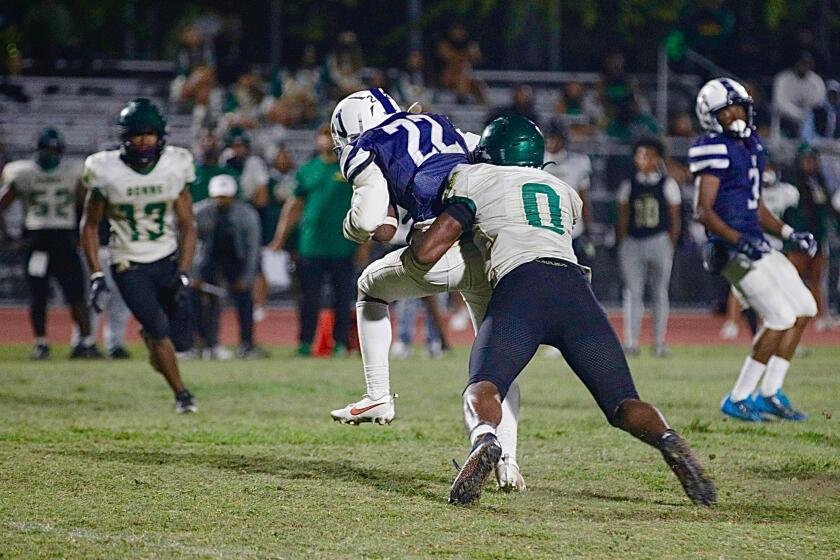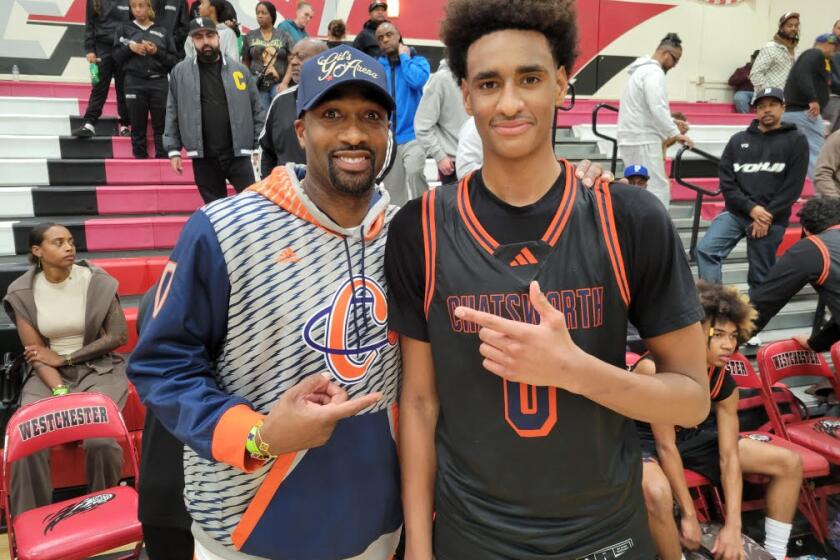STOPS SWINGING : Evert Faces Facts, Sees That Her Time Has Come
NEW YORK â The stadium court crowd was standing and applauding her for what she had been, not for what she was Tuesday. Ted Williams hit a home run in his last at-bat. Chris Evert grounded out.
Her No. 4 world ranking doesnât begin to show how the thing that made Evert great -- her intensity -- had plummeted. That she called Sundayâs 6-0, 6-2 victory over 15-year-old Monica Seles one of the two greatest of her U.S. Open career speaks volumes about Evertâs lost lust for victory.
The day that six-time Open champion Evert no longer expects to win tournaments and is thrilled to beat a 99-pound, 15-year-old is the day she should retire.
And nobody knows it better than Evert. Which is why she decided this summer that this, her 19th Open, would be her last, and the end of her Grand Slam career. Which is why when Evert, serving for the first set, blew a 5-2 lead to Zina Garrison Tuesday and left the Open stage forever after an uninspired 7-6 (7-1), 6-2 quarterfinal defeat, nobody was less surprised than she.
âThatâs one of the reasons Iâm retiring,â a red-eyed Evert said. âI squandered that lead. I shouldnât have let it get away. I played a great match the other day, and I was kind of flat today. Thatâs how itâs been all year.â
Itâs been the first year of Evertâs career in which she realized she was past her prime. By all accounts, she is happy in her marriage to former U.S. Olympic skier Andy Mill. They have a 6,000-square foot house outside of Aspen, Colo., that she truly longs to live in. She will be 35 in December. Her priorities have drastically changed.
And as they have, her legendary intensity has vanished. Never a great athlete but always one of sportsâ fiercest competitors, Evert began losing to women -- and girls -- who never could have beaten her former ultra-intense self. Evert pulled out of this yearâs French Open, a tournament sheâd won seven times, after losing at Geneva to Barbara Paulus. She watched it on TV in Florida. Did she yearn to be in Paris? No way.
She yearned to make a big splash in her Open farewell. She had made the Open semifinals 17 of 18 times.
Make it 17 of 19.
âThat (intensity) is what makes you a champion,â Evert said. âThere are a lot of players who can cause upsets and then, two days later, lose to someone ranked (No.) 100 in the world. Thatâs why players like Steffi (Graf) and myself in the past, Martina (Navratilova), thatâs why we have been great because we have been able to take each match and isolate it and never have a letdown in a two-week tournament. This year, I have had letdowns after big matches, and that puts me right in with the average player.â
History will regard her far differently. Has any athlete in a major sport performed at a higher level longer than Evert? Since she began playing the womenâs tour regularly in 1975, Evert has been ranked No. 1 in the world five times and No. 2 seven times. In the last two years, at her nadir, she was ranked No. 3. Some nadir.
Evert has won more singles titles (157) than anyone, and even with Tuesdayâs defeat, Evert reached the semifinals or better an unprecedented 52 of 56 times in Grand Slam events.
Add she was president of the Womenâs Tennis Association for five years, has been a model of grace and good sportsmanship on the court and a friend to lesser players off it, and she bows out with a reputation as good as her record.
But Tuesday, she was the indifferent and inconsistent player she is now resigned to being. Admittedly, she is no longer willing to pay the price. But that didnât mean she felt relieved when it was over. Chris Evertâs greatness may be history, but it is hardly ancient history.
âI was thinking Iâd be relieved when the tournament was over for me,â she said. âBut the way I lost, Iâm not relieved.â
Garrison was. Although she is the tournamentâs No. 5 seed, Garrison, 26, had beaten Evert only once in 10 tries before Tuesday. Such is the gap in womenâs tennis.
Almost as big as the gap between the 21,000 stadium court patrons who were rooting for Evert, and the two or three who were rooting for the otherwise likable Garrison. Like nearly every woman on the tour, Garrison grew up admiring Evert. After her landmark victory, Garrison recalled being 15 or 16 and going with fellow future pro Lori McNeil -- the only other person to knock Evert out of the Open (1987) before the semifinals -- to see Evert when Evert came to Houston, their hometown. Their biggest kick was getting Evertâs autograph.
Tuesday, to the displeasure of nearly everyone in attendance, Garrison wrote Evertâs Grand Slam epitaph. And afterward, she delivered a eulogy of her own.
âThis was the hardest match I ever played in my life,â Garrison said, âbecause it was such an emotional match. Sheâs meant so much to the game. Sheâs such a lady. To be the villain, to have to take her out of this tournament, itâs good for me, but it wasnât good for me.
âMaybe I can take over where she left off.â
Zina Garrison said that last thing because there were more than a hundred media people sitting there and there was empty air to fill. But deep down, she and everyone else in the room knew better than that.
You donât replace Christine Marie Evert.
More to Read
Go beyond the scoreboard
Get the latest on L.A.'s teams in the daily Sports Report newsletter.
You may occasionally receive promotional content from the Los Angeles Times.










